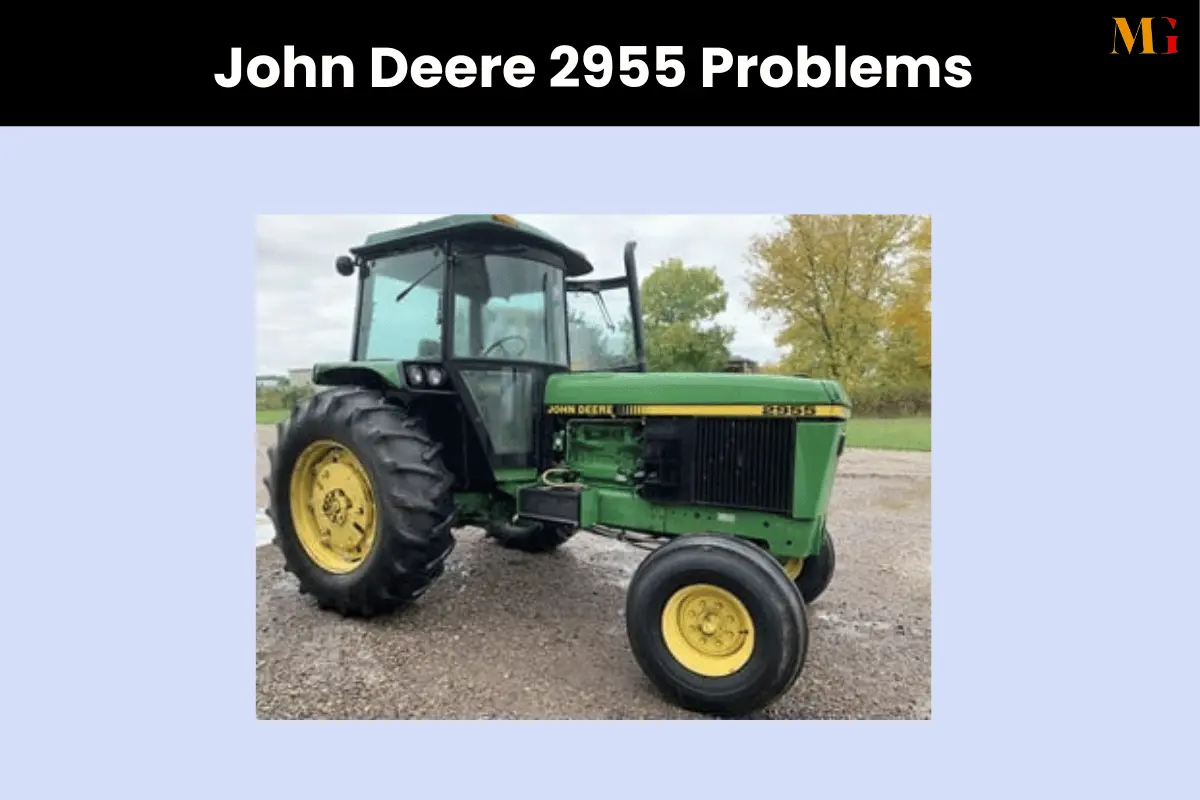The John Deere 2955 is a reliable tractor, but it has some issues. Knowing these problems can save time and money.
Farmers and tractor enthusiasts often praise John Deere for its durable machines. The 2955 model, though, has its share of common problems. From engine troubles to hydraulic issues, these setbacks can be frustrating. Understanding these problems helps in better maintenance and quicker solutions.
In this blog, we will explore the most frequent issues faced by John Deere 2955 owners. This knowledge can help you keep your tractor in top shape and avoid unexpected breakdowns. Stay with us as we dive into the details of John Deere 2955 problems.
Engine Issues
The John Deere 2955 is a reliable tractor for many farmers. Yet, like all machines, it can face issues. Engine problems are among the most common. Recognizing these problems early can save time and money. Here, we discuss some common engine issues.
Overheating
Overheating is a frequent problem with the John Deere 2955. It can result from a clogged radiator. Dirt and debris often block the radiator fins. This prevents proper cooling. Inspect the radiator regularly. Clean it to ensure good airflow. Also, check the coolant level. Low coolant can cause the engine to overheat. Always keep it at the recommended level.
Starting Problems
Another common issue is starting problems. The engine may turn over slowly. This can be due to a weak battery. Test the battery voltage. Replace it if necessary. The starter motor can also be a culprit. Inspect it for wear and tear. Additionally, check the fuel system. A clogged fuel filter can hinder starting. Replace the fuel filter if it’s dirty.
Hydraulic System Problems
The John Deere 2955 is a robust tractor, renowned for its reliability and performance. However, like any machine, it’s not exempt from issues. One area that often raises concerns among owners is the hydraulic system. Let’s delve into some common hydraulic problems and how to address them.
Low Pressure
One of the most frustrating issues you might face with the John Deere 2955 is low hydraulic pressure. Imagine being in the middle of a busy day on the farm, and suddenly, your tractor’s hydraulic functions become sluggish. Annoying, right?
Low pressure in the hydraulic system can stem from various causes. Here are some potential culprits:
- Clogged hydraulic filters
- Worn-out hydraulic pump
- Hydraulic fluid leaks
Regular maintenance is key to preventing these issues. Ensure you replace filters according to the manufacturer’s schedule and check for any signs of leaks or wear.
Leaking Hoses
Another common problem is leaking hoses. If you’ve ever seen hydraulic fluid dripping, you know it’s not just messy; it can also lead to more severe issues if not addressed promptly.
Leaking hoses can result from:
- Wear and tear over time
- Improper installation
- Physical damage from external factors
Spotting a leak early can save you from a big headache. Here’s a tip: regularly inspect the hoses for any cracks or abrasions. If you find a damaged hose, replace it immediately. Better safe than sorry!
Remember, a well-maintained hydraulic system not only ensures efficient operation but also extends the life of your tractor.
Electrical System Failures
Electrical system failures are common issues for John Deere 2955 tractors. These problems can lead to significant downtime and maintenance costs. Understanding the main electrical issues can help prevent and solve these problems more effectively.
Battery Drain
A frequent problem in John Deere 2955 tractors is battery drain. This issue often arises due to leaving lights on or faulty components. Regular battery checks can help identify signs of wear or damage. Replacing old batteries can also prevent sudden failures in the field.
Faulty Wiring
Faulty wiring is another common electrical issue in John Deere 2955 tractors. Worn or damaged wires can cause short circuits. This can lead to various electrical failures. Inspecting the wiring regularly can help identify and fix potential problems. Ensure all connections are secure and free from corrosion.
Transmission Troubles
Dealing with John Deere 2955 problems can be quite a headache, especially when it comes to transmission troubles. This well-loved workhorse is known for its reliability, but like any machine, it can have its off days. Let’s dive into some common issues related to the transmission and how they can affect your tractor’s performance.
Gear Slippage
One of the most frustrating issues you might encounter is gear slippage. Imagine this: you’re in the middle of a big job, and suddenly, the tractor won’t stay in gear. Talk about a mood killer! This issue can be caused by several factors, including worn-out gears, a faulty clutch, or low transmission fluid.
- Worn-out gears: Over time, the gears can wear down, making it difficult for them to engage properly.
- Faulty clutch: If the clutch isn’t functioning correctly, it can lead to gear slippage.
- Low transmission fluid: This might seem simple, but low fluid levels can cause significant problems. Always check and maintain proper fluid levels.
To fix gear slippage, start by checking the transmission fluid. If it’s low, top it up and see if that resolves the issue. If not, you might need to inspect the gears and clutch for wear and tear. Remember, it’s always a good idea to consult a professional if you’re unsure.
Difficulty Shifting
Another common problem with the John Deere 2955 is difficulty shifting. Have you ever tried to shift gears, only to find the lever stubbornly stuck in place? It’s a common frustration among tractor owners.
- Clutch adjustment: Sometimes, the clutch just needs a little tweak to make shifting smoother.
- Linkage issues: The shift linkage can become worn or misaligned, causing difficulty in shifting gears.
- Internal transmission problems: In some cases, the issue might be more serious, such as internal damage to the transmission components.
To troubleshoot difficulty shifting, start by checking the clutch adjustment. If it’s too tight or too loose, it can cause problems. Adjusting the clutch might just do the trick. Next, inspect the shift linkage for any signs of wear or misalignment. If everything looks good but the problem persists, it could be an internal issue, and you might need to call in the experts.
In conclusion, while transmission troubles can be a nuisance, they’re not insurmountable. With a bit of patience and some basic troubleshooting, you can keep your John Deere 2955 running smoothly. And remember, when in doubt, don’t hesitate to seek professional help. After all, a well-maintained tractor is a happy tractor!
Steering Malfunctions
Steering malfunctions in the John Deere 2955 can be frustrating. They affect your ability to control the tractor. If not addressed, these issues can lead to accidents. Two common steering problems are a loose steering wheel and hard steering.
Loose Steering Wheel
A loose steering wheel can make driving the John Deere 2955 difficult. It may wobble or feel unsteady. This can be due to worn-out steering components. Regular checks can help identify loose parts. Tightening bolts or replacing worn parts can fix the issue. Always ensure the steering wheel feels firm and secure.
Hard Steering
Hard steering can make maneuvering the John Deere 2955 a challenge. This problem can arise from low hydraulic fluid levels. Checking the hydraulic fluid regularly can prevent this. Another cause might be a malfunctioning power steering pump. Replacing the pump can restore easy steering. Regular maintenance keeps the steering smooth.
Pto (power Take-off) Concerns
John Deere 2955 tractors are reliable. But they can have issues. One common area of concern is the PTO. The PTO is crucial. It powers attachments and implements. Problems with the PTO can hinder work efficiency. This section will discuss common PTO issues.
Pto Not Engaging
Sometimes the PTO does not engage. This issue frustrates many owners. The problem might be electrical. Check the switch and wiring. Faulty switches can prevent engagement. Look at the safety interlock system. It must function correctly.
Hydraulic issues can also cause problems. Low hydraulic fluid is a common culprit. Ensure fluid levels are adequate. Check for leaks in the system. A faulty hydraulic pump can also be the problem. Regular maintenance can prevent many of these issues.
Pto Shaft Vibration
PTO shaft vibration is another concern. It can cause damage. Loose connections often cause vibrations. Tighten all connections and bolts. Worn bearings can also cause vibrations. Inspect and replace if needed.
Check the alignment of the PTO shaft. Misalignment leads to vibration. Ensure the shaft is straight. Regular inspections can catch issues early. Addressing them promptly prevents bigger problems.
Brake Problems
Brake problems are common with the John Deere 2955 tractor. These issues can affect performance and safety. Understanding these problems can help in finding solutions.
Soft Brakes
Soft brakes can be frustrating and dangerous. This issue often means the brake system has air. Air in the brake lines reduces braking power. Bleeding the brakes can help. This process removes the air and restores proper function. Regular checks can prevent this problem. A well-maintained brake system is crucial for safe operation.
Brakes Not Holding
Brakes not holding can cause serious trouble. This issue might be due to worn-out brake pads. Brake pads wear down over time and need replacing. Checking the pads regularly can prevent this problem. Another cause could be brake fluid leaks. Leaks reduce braking power and need immediate attention. Always inspect brake lines and seals for any leaks. Replacing damaged parts ensures safe operation of the tractor.
Fuel System Issues
The John Deere 2955 is a reliable tractor. But it can face some issues. Fuel system problems are common. These issues can affect the tractor’s performance. They need prompt attention to keep the tractor running smoothly.
Fuel Leaks
Fuel leaks are a significant issue in the John Deere 2955. Leaks can occur at various points in the fuel system. This includes the fuel lines, fuel tank, and injectors. Leaks can lead to fuel wastage and fire hazards. It’s crucial to inspect the fuel system regularly. Look for signs of leaks and address them immediately.
Clogged Fuel Filters
Clogged fuel filters are another common problem. They restrict fuel flow to the engine. This can result in poor engine performance. Symptoms include difficulty starting, power loss, and rough idling. Regular maintenance of fuel filters is essential. Replace them as per the manufacturer’s recommendations. This ensures smooth fuel flow and optimal engine performance.

Credit: www.bidschmid.com
Frequently Asked Questions
What Is Considered High Hours On A John Deere Tractor?
High hours on a John Deere tractor are typically over 5,000 hours. Regular maintenance can extend its lifespan.
What Year Did John Deere Make The 2955?
John Deere made the 2955 tractor from 1987 to 1992. This model is known for its reliability and performance.
Which John Deere Tractors Are Being Recalled?
John Deere recalls involve certain models of compact, utility, and row-crop tractors. Specific models include the 4044R, 4052R, and 4066R.
What Is The Life Expectancy Of A John Deere Riding Mower?
A John Deere riding mower typically lasts 10 to 15 years with proper maintenance. Regular servicing extends its lifespan.
What Are Common John Deere 2955 Problems?
Common issues include hydraulic system failure, overheating, and electrical problems. These problems can affect performance.
How To Fix John Deere 2955 Hydraulic Issues?
Check hydraulic fluid levels and filters. Replace any damaged parts. Consult a mechanic if problems persist.
Conclusion
Addressing John Deere 2955 issues can save time and money. Regular maintenance prevents many problems. Always follow the manual’s guidelines for best results. Quick fixes can often be DIY. For bigger issues, consult a professional. A well-maintained tractor lasts longer.
Stay proactive and keep your equipment in top shape. Happy farming!

